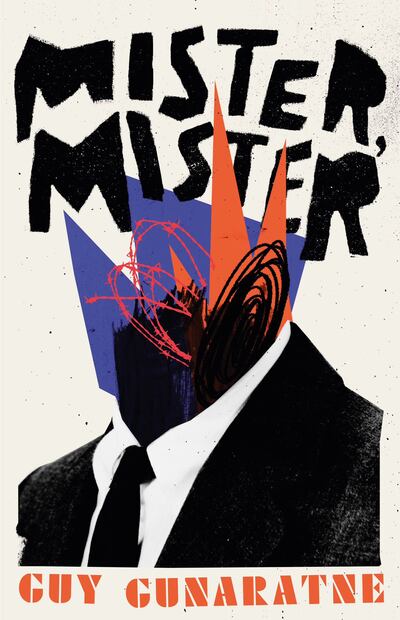We first meet the enigmatic Yahya Bas in a UK detention centre, being held as a suspected terrorist, having just fled the war in Syria. Sitting across from his shadowy interrogator, however, he is unintimidated and feeling chatty – despite having just cut off his own tongue.
So begins Guy Gunaratne’s Mister, Mister – the much-anticipated follow-up novel to the author’s Man Booker longlisted In Our Mad And Furious City.
Although five years apart, similar themes of national identity, radicalisation and political conflict feature heavily here too, again with the lead character unwittingly serving as both collateral damage and conduit for larger conversations on deeply divided societies and the human costs of war.
However, from the “scowling youth” of East London of his debut, this time Gunaratne tells the story of the life and times of 25-year-old British-Iraqi Yahya – an account many would question if it’s Gunaratne’s place to tell in the first place.
“I think these conversations around authentic representation are extremely important, and people might be surprised at the absence in my books of what they assume to be my own experience as a British-Sri Lankan,” he says. “But neither mine nor Yahya’s is a homogenised story, and where both Yahya is and I am is a circular experience.”
A novel richly laced with an assortment of well-versed references to classical Arabic literature, Quranic lexicon, and contemporary parlance, Gunaratne admits to using the development of Yahya’s character as an excuse to further explore his deep interest in both Arabic poetry and Islamic philosophy.
“I was extremely privileged to be able to dedicate six years to this work, consulting heavily with both friends and my publisher to go over the blind spots and sensitivities – which in actuality are more the little nuances that I feel that could undermine the larger aspects of the project.”

“For this is first a story about storytelling,” Gunaratne says. “A performative story if you will, of father and son, of the process of individuation and of taking comfort in unbelonging.”
While Gunaratne has a penchant for crafting audaciously theatrical narratives, he also holds a fondness for testing the limits of the vernacular.
“I try to let the voice come first with my characters, but while there is room for great articulation from the depth which language offers, through Yahya there’s also a tension in terms of what language is for and to what extent it can be used before being deemed inadequate.”
But now tongueless, Yahya chooses to instead write down his defence for the benefit of his interlocutor – leaving no room for dialogue or contagion. This is Yahya Bas’s story, and he and only he will tell it.
Having been “raised by many mothers” with the overarching presence of his paternal uncle, Yahya charts out a dysfunctional life of being shaped by the many idiosyncratic characters that populated his upbringing, and defining moments triggered by an exclusionary society. All this through an episodic first-person account of evocative recollections: the picaresque.
First a perceptive little “goat-boy”, then attaining notoriety as an incendiary poet, to his departure to Syria in search of his father, and then eventual return to the UK. From the many lives lived in the body of one, Yahya is now resisting and dismantling the many essentialised monikers that were forced upon him during the course of his eventful life. “Idiot”, “poet”, “son” – he may have been all of those at a certain point in time, but none any more.
“Even when forced to define himself, he isn’t searching so much for belonging rather questioning the concept of belonging itself,” Gunaratne explains.
Set against a backdrop of historical events that shaped the late 90s to the early millennium – from the death of Princess Diana to September 11 and the invasion of Iraq – many readers hailing from immigrant families would relate, as does Gunaratne, to the social conditioning of this collective memory, and the constant need to either defend, condemn, or pick a side.
However, in Bas’s radical extrication first from nationalistic identity, we are also offered many a canny bird's eye interpretation of Britishness in all of its livery.
“While I had a clear idea of what I wanted Mister, Mister to be about, a few events that occurred during the writing of this book I have allowed to bleed into the novel,” the author says. “The Shamima Begum case for instance affected me deeply, and perhaps adds greater depth to the discourse on citizenship. And the only way sometimes, to face up to these discussions is through theatrical conversations such as this.”
Through his disarming picaro (a subtle Dickensian-Gunter Grass remix), Gunaratne tackles the many complexities of identity by drawing from the writings of Caribbean poet and philosopher Edouard Glissant in finding “new availabilities of being”.
Quite unlike his loose-lipped protagonist however, Gunaratne takes his time to consider each thought.
“There is a liberation I suppose when anyone recognises their own multiplicity – when you acknowledge that you are a product of many places, things, and others – and so your sense of self becomes multifarious. You are comfortable with this sense of place that is generative; a place of invention and imagination, and find a new mode with which to be.”
Gunaratne’s well-informed version of storytelling can perhaps be attributed to a previous life as a documentary filmmaker, though he has no qualms in admitting to taking great comfort in the selfishness allowed to him in writing novels.
“Writing a novel is a very very private and personal experience, as it is equally a deeply intimate experience reading it. It’s a genius, generous form of art really, and it gives me the chance to first process for myself events that have deeply moved me, and then what you’re doing is asking people to sit down with you, think for a while, and emote with you.
“That being said, I also think that reading works of fiction and measuring them against reality is a wrong-headed way to think about fiction. I think it just denies it as art.”
And as promised, with Mister, Mister Gunaratne leaves readers simmering with the many questions posited by the very audible performance of his mute storyteller, hoping in the end that they too will “rethink how we write ourselves and the stories of people like Yahya Bas”.






